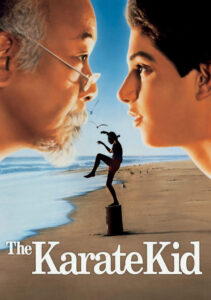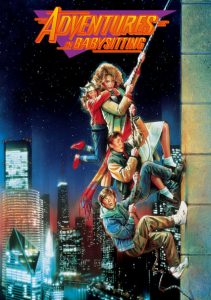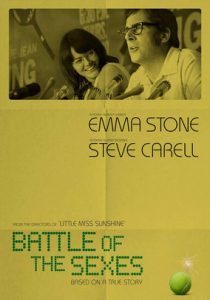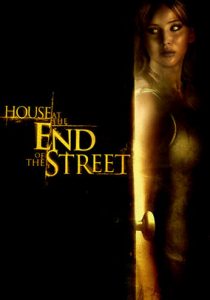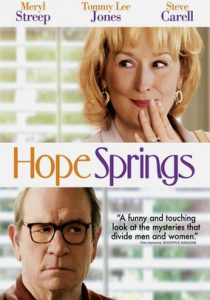The Karate Kid-1984
Director John G. Avildsen
Starring Ralph Macchio, Pat Morita
Scott’s Review #1,241
Reviewed April 2, 2022
Grade: B+
The Karate Kid (1984) is a wholesome and predictable film from the commercial entrails that were the 1980’s cinema.
With a clever marketing pitch about a bullied boy overcoming obstacles, the film is utterly predictable. But the warm message and chemistry between the two leads make the film work marvelously.
It’s a truthful film that showcases the power of friendship.
The film was a smash at the box office becoming one of Hollywood’s biggest sleeper summer hits of 1984, making the lead actor Ralph Macchio an enormous star and household name. It also successfully brought karate to American households spanning a new trend and appreciation for Asian sport.
The film was followed by three tired sequels before the franchise finally ran out of steam. A re-launch emerged in 2010 with mixed results.
Daniel (Macchio) moves to Southern California with his mother, Lucille (Randee Heller), but quickly finds himself the target of a group of bullies who study karate at the Cobra Kai dojo.
This heightens in severity when he becomes smitten with the ex-girlfriend (Elisabeth Shue) of the lead bully, Zabka (Johnny Lawrence) who vows revenge on Daniel.
Fortunately, Daniel befriends Mr. Miyagi (Noriyuki “Pat” Morita), a kindly repairman who is a martial arts master himself. Miyagi takes Daniel under his wing, training him in a more compassionate form of karate, and prepares him to compete against the brutal Cobra Kai.
The Karate Kid is very sweet but never too saccharin-laced and is easy to compare to Rocky (1976).
In a clear example of manipulation and copycatting, Robert Mark Kamen, who wrote the screenplay, was instructed to write something similar to Rocky which won the Academy Award for Best Picture.
Avildsen also directed that critically acclaimed film.
The result is Rocky-lite. The Karate Kid would be a great warm-up film before the headliner Rocky takes the screen.
The mission is to tell a story about an underdog rising to glory while staying true to himself. The Karate Kid is a product but is extremely likable and a fist-pumping good time. It’s not the sort of film one necessarily needs to see repeatedly nor will it be studied in film school.
The main reason that The Karate Kid works is because of the chemistry and connection between Macchio and Morita. The latter is terrific casting since Morita was usually known for comedic roles but works against type in his memorable role.
His character is kind and humble and impossible not to fall in love with. As a mentor, he coaches Daniel with valuable and truthful life lessons.
Macchio surprisingly carries the film. Handsome and charismatic, he also represents to the audience anyone who has ever felt like an outsider or different from everyone else. He’s the boy next door but with an ethnic overtone. He is clearly different and therefore unliked by some.
The elements that don’t work as well are the traditional love triangle, hardly a triangle because one of the three is the villain and the stereotypical nature of the bully gang.
Shue plays her part well but the romance between Ali and Daniel is the supporting act to the fight scenes which inevitably show up mostly towards the end of the film.
The finale is one very familiar in sports-type films because it’s all too obvious how events will play out. Surprisingly though, it’s a satisfying payoff as every character wins out, even the villainous Johnny.
Though he is soundly defeated, he learns a lesson from Daniel and comes to respect him. So, he repents.
It’s a powerful message that stayed with me and made me appreciate the approach to valued storytelling.
Safe and sturdy for a PG audience, The Karate Kid (1984) may feel dated and flounder for modern audiences but the message remains poignant and fresh. Hard work, determination, and respect equal success and satisfaction.
This may be a point easy to ridicule and pick apart but the film works well.
Oscar Nominations: Best Supporting Actor-Pat Morita
